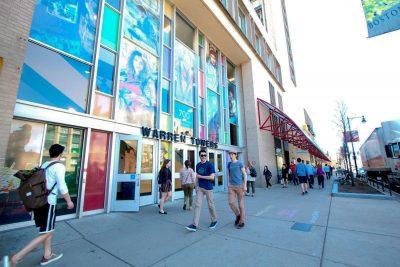
The COVID-19 pandemic has left Boston University near-empty with deserted dormitories. A group of decarceration advocates are proposing a new use for these spaces.
BU Coalition for Decarceration has been petitioning since May 11 for President Robert Brown and the BU Board of Trustees to convert vacant on-campus residential buildings into temporary housing for those recently released from incarceration.
The coalition, comprised of BU students, faculty and alumni, aims to address issues surrounding mass incarceration in the U.S.
The American Civil Liberties Union reports that carceral institutions have become epicenters of coronavirus outbreaks. Close quarters leave jailed individuals and prison staff highly susceptible to contracting and spreading the virus among themselves and to those outside.
Lowering prison populations by reducing arrests for minor offenses and permitting early release of certain individuals could drastically decrease the virus’s overall impact, according to the ACLU.
CoDe leader Sonali Rathod, a rising second-year in BU’s School of Medicine, said the petition’s goal is to alleviate the public health crisis in prisons and their surrounding communities.
She said that by providing housing for individuals released from prison, BU can relieve current pressures on Boston shelters and other organizations supporting the incarcerated.
Rathod said she was inspired to create the petition after noticing how overcrowding has affected the spread of not just the coronavirus, but also other contagious diseases in prisons.
“We’re talking about people who live in crowded dormitories in prisons and jails where they cannot get six feet apart. It’s just impossible,” Rathod said. “There’s no way that we can say that it’s safe for everyone in the state until we’re protecting people who are the most vulnerable, the people who can’t socially distance.”
University housing could be critical to ensuring a smooth decarceration process in response to the coronavirus, said John Larivee, president and CEO of Community Resources for Justice, a Boston-based organization providing social justice services to communities in the Northeast.
“A great effort has been made across the country at federal, state and local levels, to try and move people out, especially people who are older or have underlying health conditions, and who the jurisdiction has determined are not that much of a risk to public safety,” Larivee said. “For us to do more, there are two principal ingredients we need, and that is staff and housing.”
Housing, Larivee said, is where universities can come in to help — especially if they don’t have student bodies occupying their dorms.
CoDe leader Punit Matta, a rising second-year student in MED, said a university is perfect for this type of operation because of already-present facilities such as dining halls and dormitories. He said the coalition, however, does not expect BU to direct financial resources to this kind of housing effort.
“Our ask is not that the University should open up and administer a temporary shelter,” Matta said. “It should really just contribute some space to the effort, which it has a lot of.”
The model BU CoDe will propose to BU administration, Rathod said, is a partnership between BU and outside organizations like the Boston Public Health Commission, who would provide services such as security, cleaning and maintenance at no additional cost to the University.
“We recognize that universities don’t have the scarce and valuable resources of a staff that can actually run these facilities,” Rathod said.
In response to an inquiry by The Daily Free Press, the University said it chooses not to comment on the petition or the general topic of potential alternative usage for empty dorms.
BU has, however, offered housing to outside residents since students left campus in March. It opened its Fenway Campus to homeless shelter employees from Boston-based shelter Pine Street Inn earlier this month.
Spencer Piston, assistant professor of political science at BU, is one of the faculty members in support of the petition. He said he believes BU has the potential to play a major role in reducing the pandemic’s impact on the Boston area through this plan.
“This is a public health crisis, and carceral spaces, prisons and jails in particular, are hotspots for COVID-19,” Piston said. “Just as a simple matter of increasing public health, I think we need to do what we can to reduce the impact on all of us by decarcerating.”
Piston added that he believes supporting the decarceration process is part of BU’s obligation as an influential institution.
“I’ve heard a lot of talk from University administration, especially leadership when it comes to what can BU do to keep going and keep delivering a good education, and that’s really important,” Piston said. “I’ve heard a lot less, though, about what obligation BU has as a citizen of the greater Boston area, of Massachusetts, of the country.”
Shaina Evans, a rising junior in the College of Arts and Sciences, said she feels the public health concerns addressed in the petition “make total sense,” especially the assertion that the health of the incarcerated is directly linked to the health of surrounding communities.
“A lot of people think that we just lock up prisoners, throw away the key, and then they’re in their own quarantine, which is just really not true,” Evans said. “2.2 million incarcerated people go in and out for court dates, for trial dates.”
Evans said she believes BU is in a better position to help than other universities may be.
“We’re a tax-exempt, private organization with a $2.3 billion endowment. I think we can afford, if not monetary donations, then public pressure,” Evans said. “We have a lot of influence over the local Boston government, more than I think we realize.”
Aidan Wright, a rising senior in CAS, said he also hopes to see BU step in.
“It’s easy to not think of prisoners as human beings as well, and I think that this petition is making a really strong case for taking care of those people,” Wright said. “BU should set an example, and I think that aiding in the housing of and release of inmates who are eligible for release is a great way to start.”














